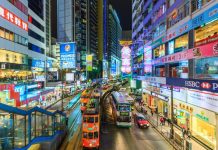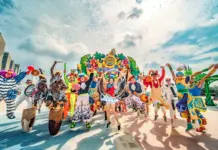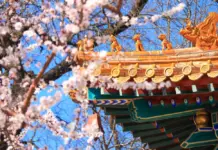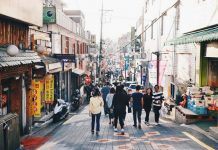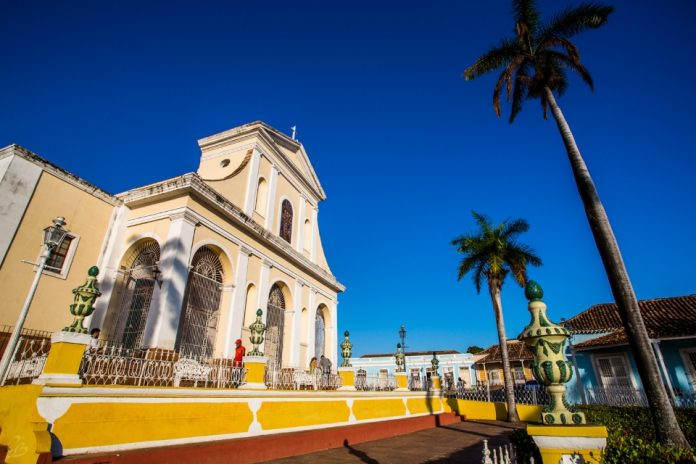
Referring to Cuba, people first think of the capital Havana with its colorful antique cars. But you should not miss the journey to the center of this country, where the town of Trinidad faces the Caribbean Sea. That land is embracing the Spanish architectural treasures of five centuries ago. Trinidad is an ancient town located nearly 320 km from the capital Havana – where traces of time are still intact. Here, time is a very relative concept, coming here you will feel like you have left the 21st century and returned to a certain ancient time. So, is Trinidad Cuba worth visiting, what to do in Trinidad in a day? Let’s check out my Trinidad travel blog (Trinidad Cuba blog, Trinidad blog) with the fullest Trinidad travel guide (Trinidad guide, Trinidad Cuba travel guide) on how to spend a day in Trinidad perfectly with top things to do in Trinidad Cuba packed in a detailed Trinidad Cuba itinerary.
- What to buy in Cuba? — Top 11+ must-have souvenirs & best things to buy in Cuba
- Havana blog — The fullest Havana travel guide for a great trip for first-timers
- 8 best places to visit in Cuba 2017
- 15 best places to visit in Bangkok for couples
- Khao Kho travel blog: How to get there, top things to do, eat, see & MORE

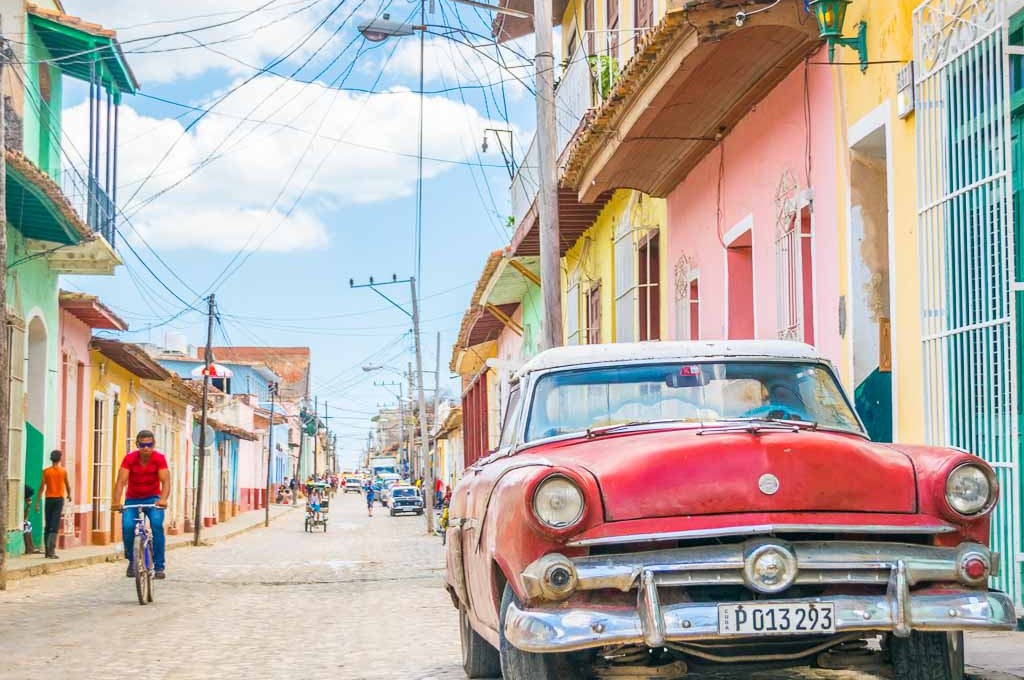
Like the mirrors placed on the boulevard along the Malecon coast in Havana, the colors of life in Trinidad always reflect the ideology and old habits of Cubans. Historical experiences and expectations for the future are reconciled in the vibrant, optimistic mental state of generations of Cubans. People often compare Trinidad as a giant outdoor museum, where each house has precious historical value, not to mention a series of large and small museums, ancient churches, old noble castles, mansions and palaces.
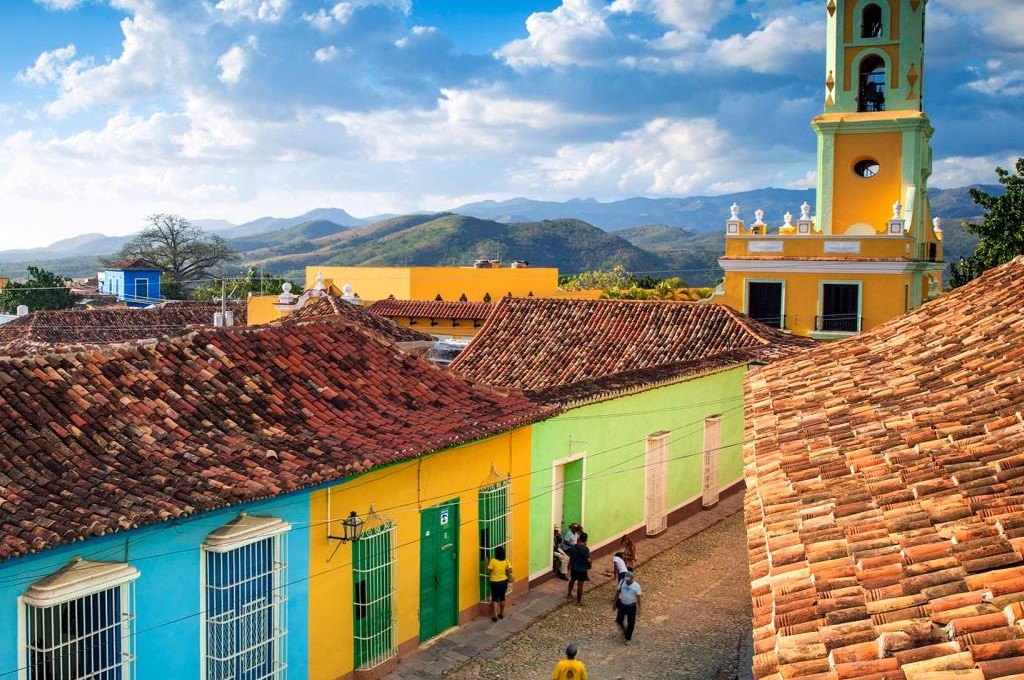
Trinidad’s old streets with colonial-style houses that have been vividly painted with pink, yellow, green… at the end of every year, but the old soul of the centuries is still there. UNESCO has recognized the old town of Trinidad as a World Heritage Site since 1988 and the city has always been worthy of that honor.
Until now, I still can’t forget the feeling when I set foot in Cuba for the first time. That night, the night wind was cool, moist, filled with a strong scent like the echo of Cuba in my mind. Cuba is a strange medley of many sounds, smells, emotions, lives, and most of all, of many eras. Here, time is a very relative concept. Sometimes we think we have left the 21st century and returned to a certain old time. That concept became more and more clear when the journey on Central America led to Trinidad, a city bordering the southern sea, located in the middle of the land strip of Cuba.
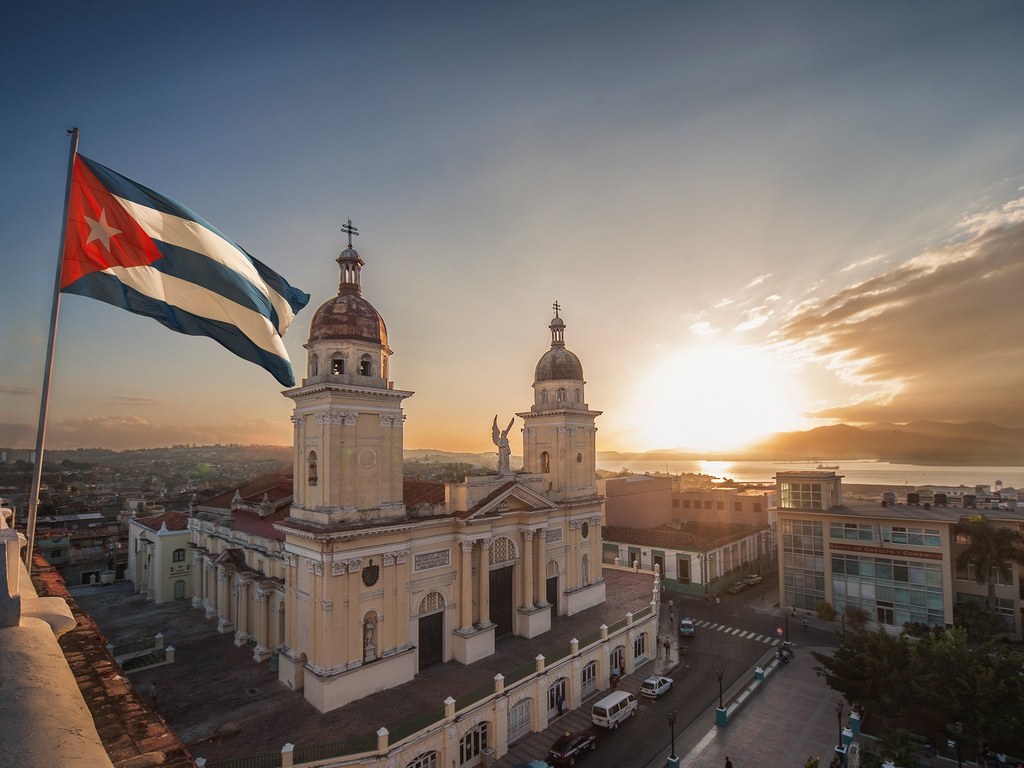
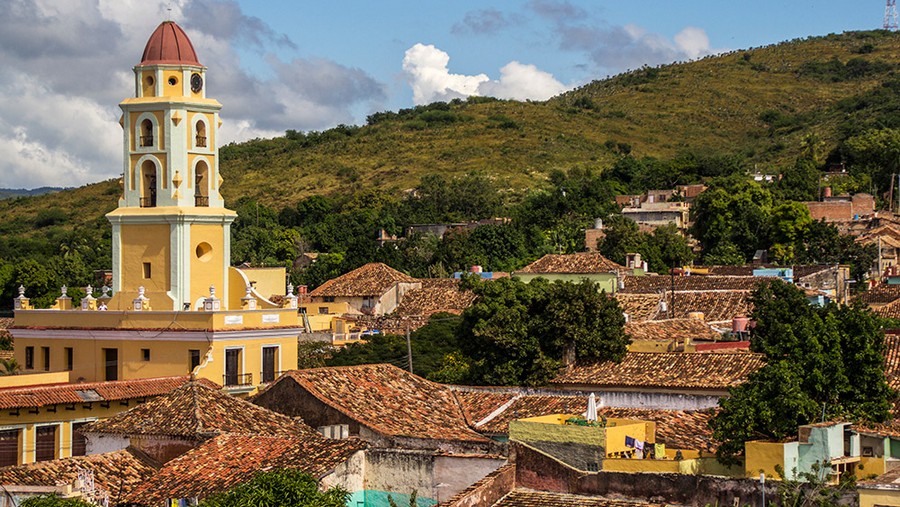
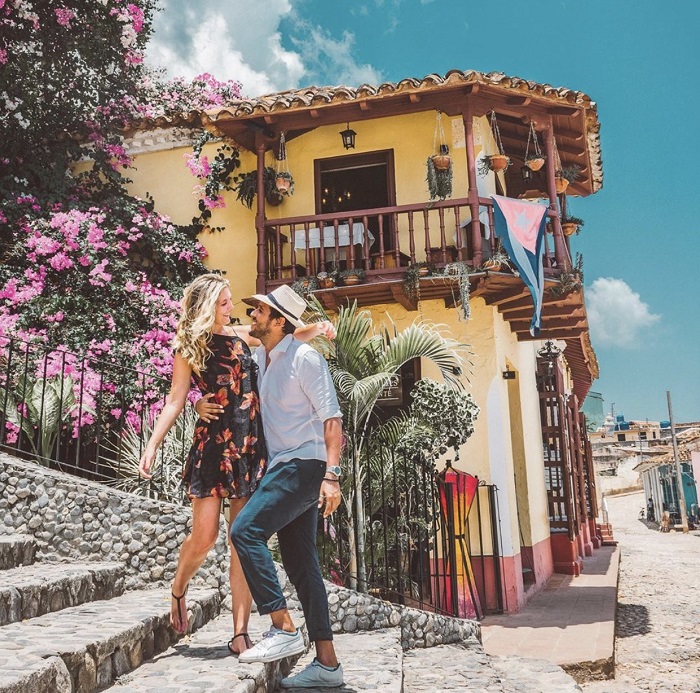
It was already late afternoon when the bus from Cienfuegos stopped in Trinidad. If Cienfuegos is a modern European city, in Trinidad, time seems to have stopped at the end of the 19th century. The atmosphere is both warm, vibrant and romantic, creeping through the small nooks and crannies of the city. And at that first sight, I knew I was going to love this place.
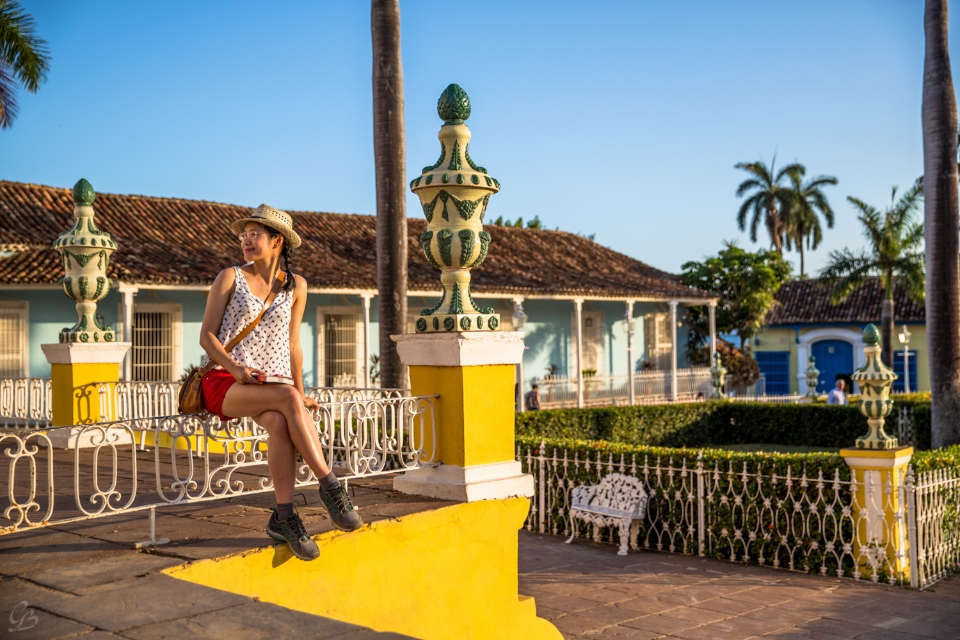
Trinidad travel blog: Slow morning
In Cuban cities, instead of renting hotels, homestays also known as casa particular, is also a good choice. My room in Trinidad was on the second floor of a traditional house, with a terrace overlooking a low-traffic alley. In the morning, that terrace becomes a small window to look into a part of Cuban life, to be curious about the ladies and sisters wearing a bunch of curling tools gathering and chatting in the alley.
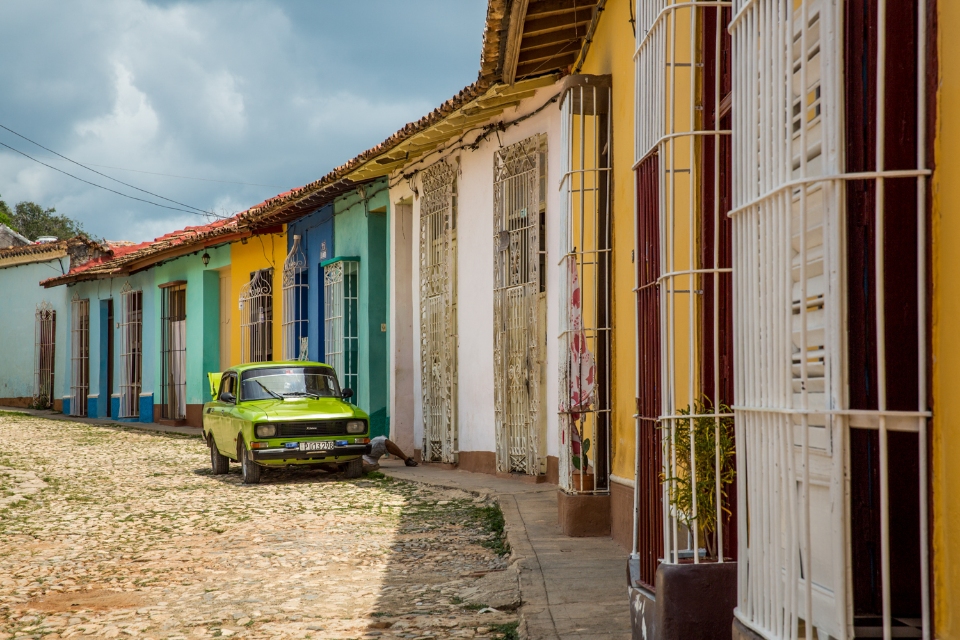
In Trinidad, going out to the street at sunrise helps us fully enjoy the quiet space of the old town that has not been stirred by crowds of tourists. The city was still sleep as the clear morning sunlight rolled down the long steps next to the church Iglesia Parroquial de la Santisima Trinidad, and illuminated the high tower of the Lucha contra Bandidos museum. There was absolutely no one on the square but a young girl in a pale yellow ruffled dress, focused on a laptop on her lap. This is an image easily seen in Cuba, where the entire communication system is controlled by the state. Each city has only a few Wi-Fi hotspots in large squares or in the halls of luxury hotels. Wi-fi is accessed with a scratch card code, purchased from an ETECSA dealer for 1.5 CUC (about $1.5) per hour, but the daytime connection is often overloaded and only gets better from midnight to early morning.

From the central square of Plazza Mayor, wandering in the old town, you will think you are get lost in space of 200 years ago. Since the 1850s, the structures in Trinidad seem to have remained the same. Around Plazza Mayor, the buildings in the Spanish colonial style were meticulously restored, now turned into beautiful museums: the museum of colonial architecture, the museum of Romatico, the archeology museum of Guamuhaya… Keep walking along the well-rounded cobblestone streets and marvel at the rows of colorful houses. Houses in Trinidad do not have the grandiose scale of Havana but are close and romantic, reminiscent of Hoi An. The facade of each house is decorated with white embossed reliefs, with iron door frames also painted in white, the pattern is simple but elegant and delicate.
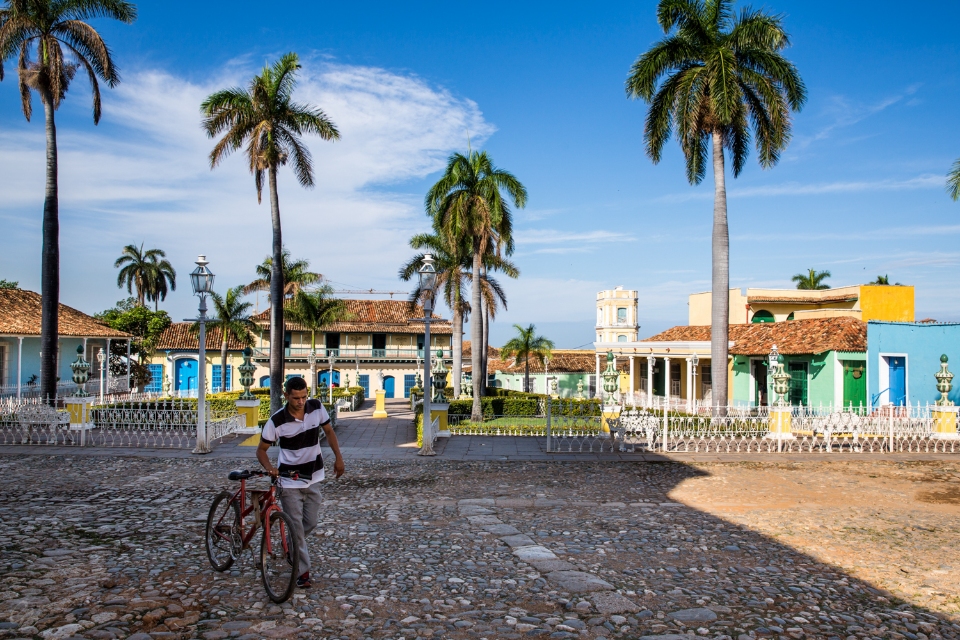
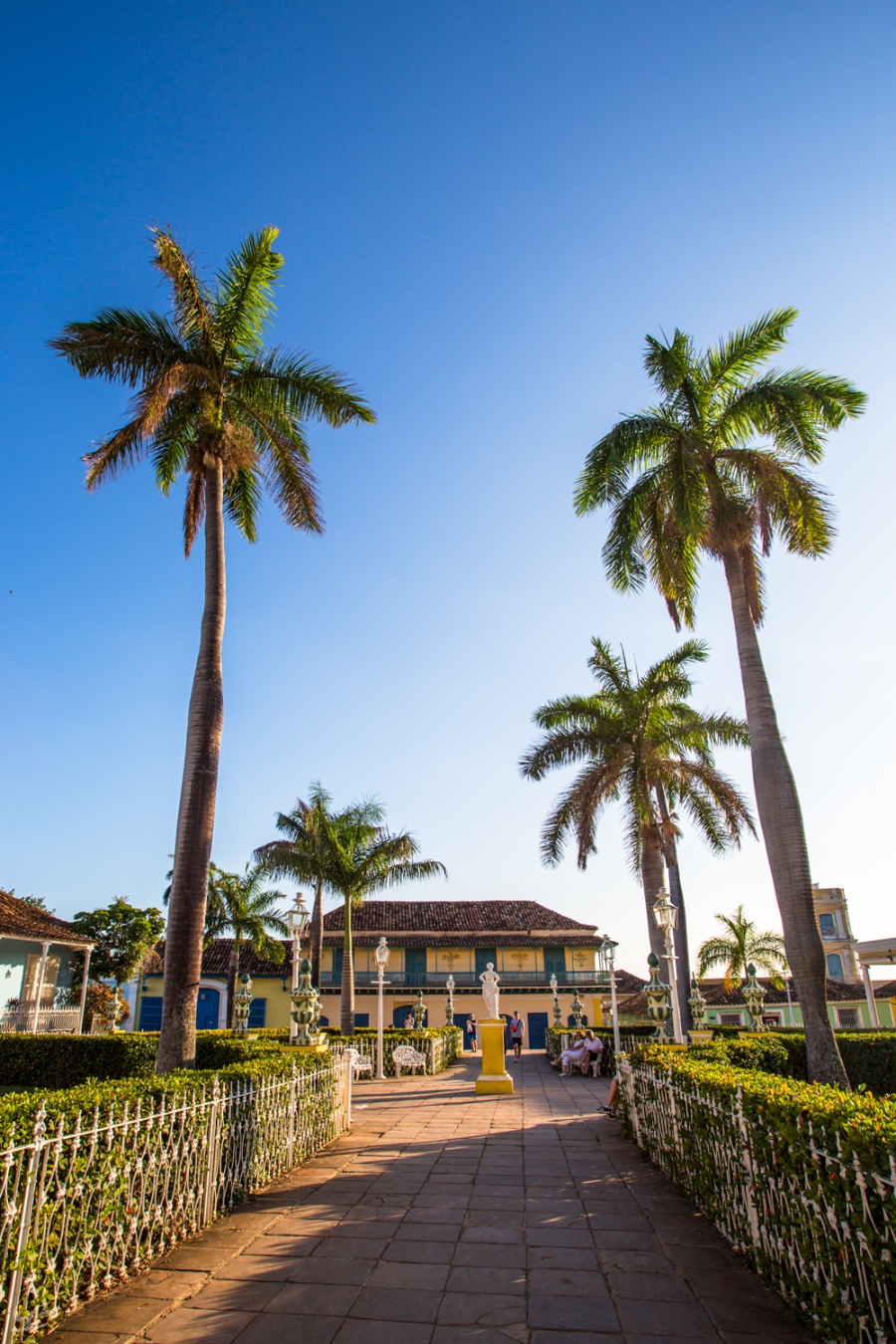
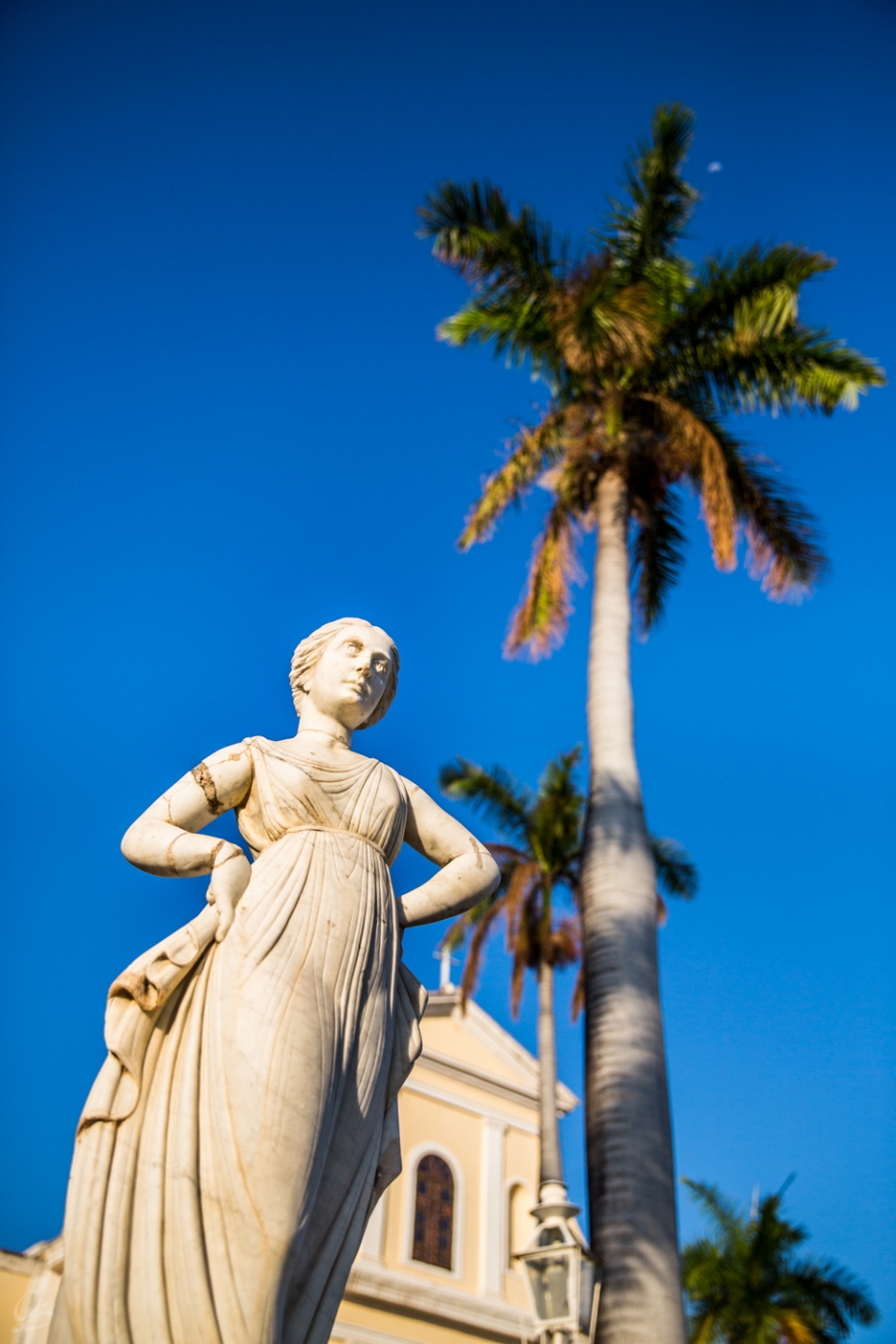
The first few days in Trinidad should be spent watching the pulse of the city that is slowly waking up. Around the streets in the center, vendors rush to open their stalls, children wearing uniforms go to school, bicycle bells jingle to ask for directions, horse-drawn carriages tap their shoes on the stone floor. Those scenes repeat every day, even though they are too ordinary, they are easy to sow nostalgia.
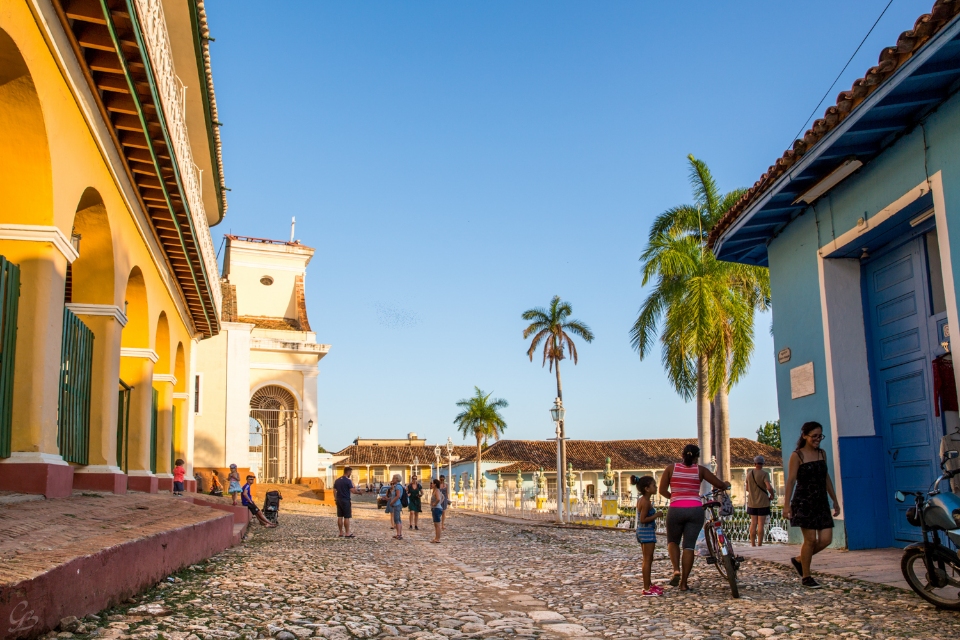
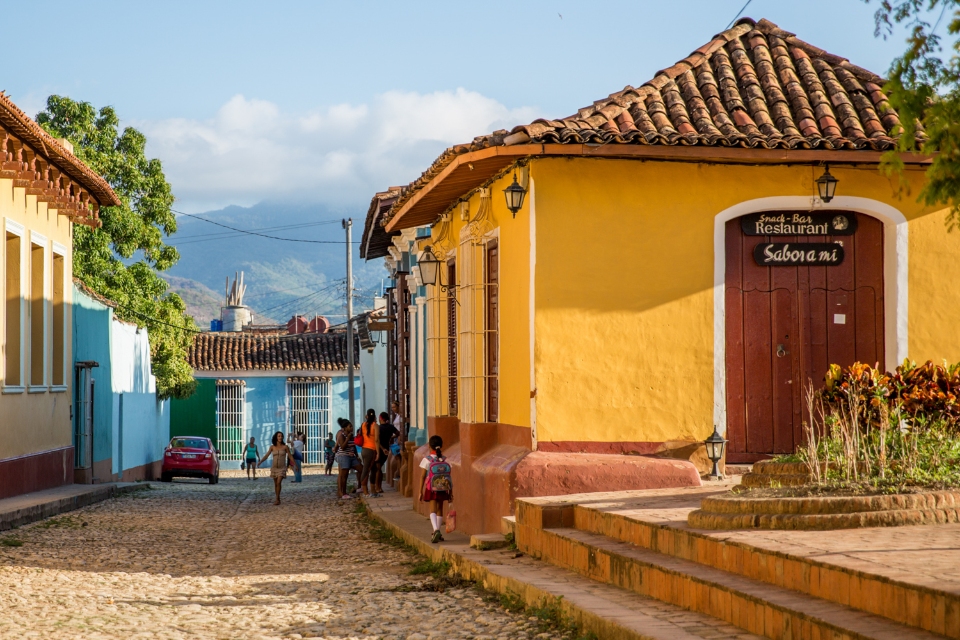
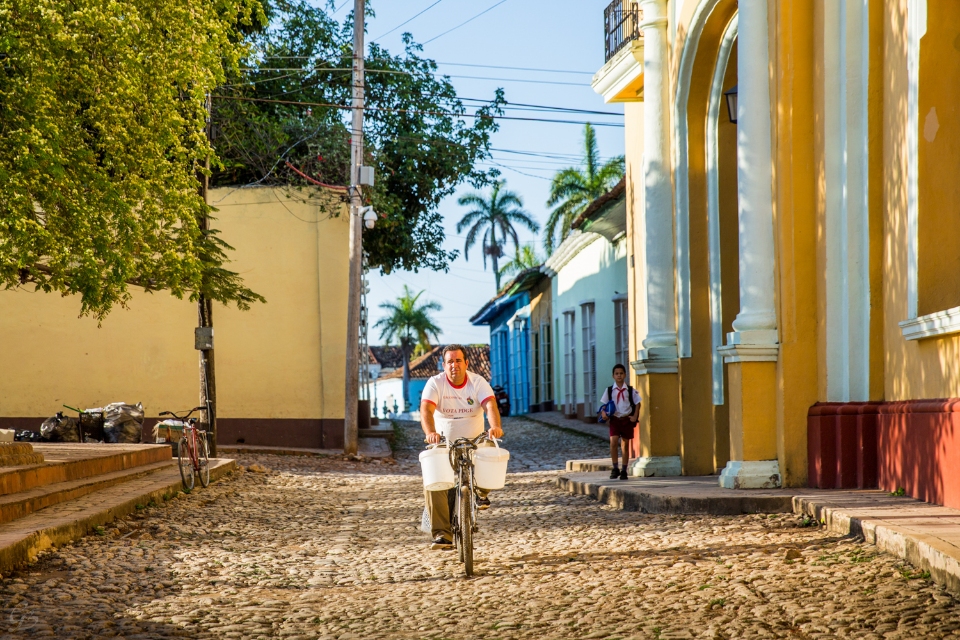

On a Saturday morning, Trinidad was quieter than usual, especially on the downtown street leading to Eduardo Garcia Delgado Elementary School. Today was a day off, but the school gate was still open. Seeing someone shyly standing at the door, the teacher waved in and led a tour of the classrooms and the simple library. The four walls of the small room were hung with timetables, rules, pictures of the twenty-four national heroes, and of course, the pictures of Fidel and Raul Castro in the most solemn position.
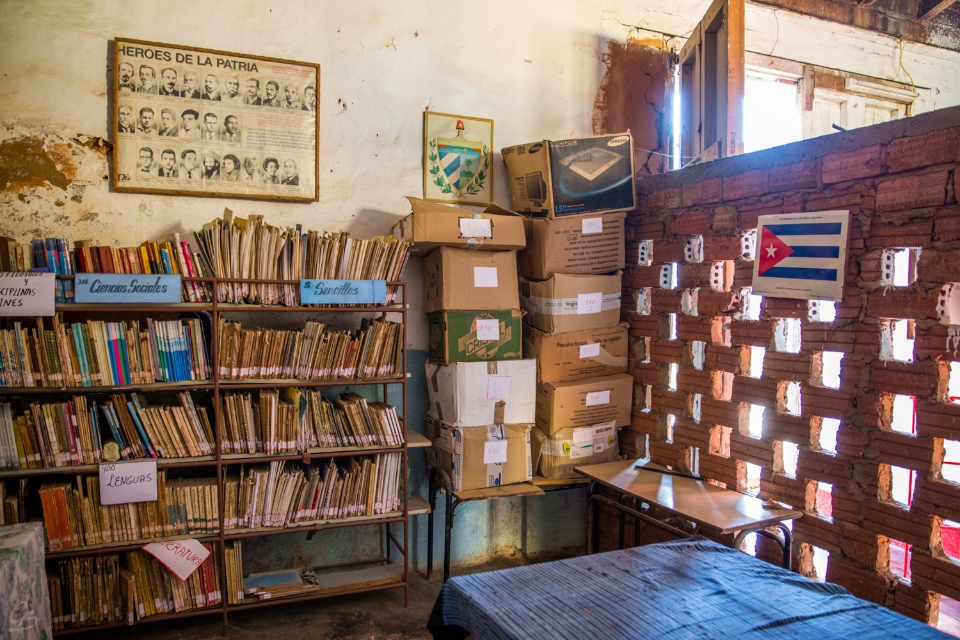

A free day, leaving the city center, the way up to the Los Ingenos valley leads up to a small hill in the east. Los Ingenos is steeped in Trinidad history. Around the first half of the nineteenth century, Trinidad was the capital of central Cuba, fertile and flourishing land with sugarcane plantations that produced one-third of the country’s sugarcane output. Then the war marked the end of that golden age. Trinidad and Los Ingenos, separated from the rest of Cuba by the Sierra del Escambray to the north, fell into recession until they found their way back to the tourism-based economy of the 1950s. Trinidad and Los Ingenos were both listed as world heritage sites by UNESCO in 1988.
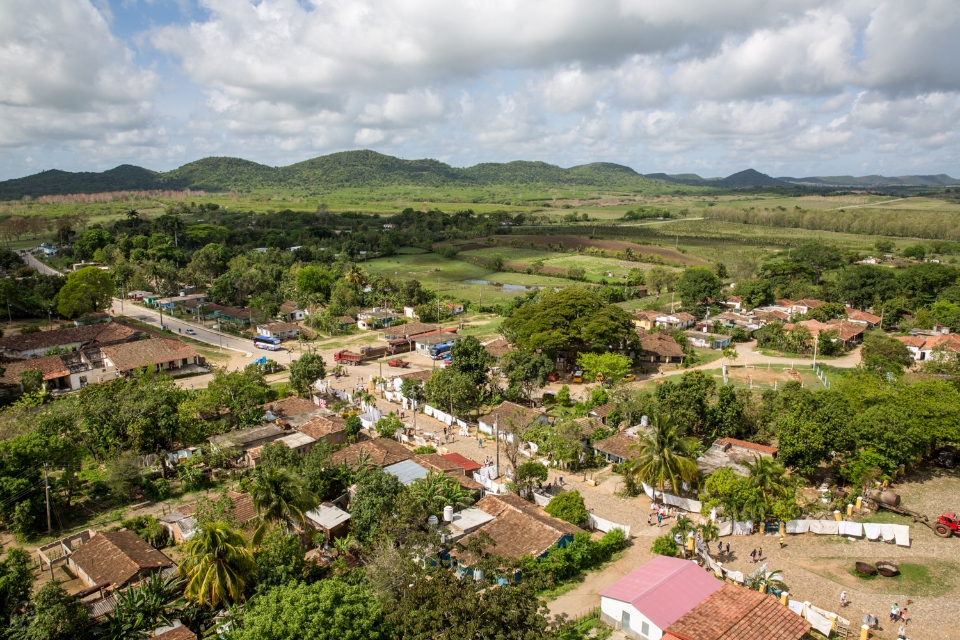

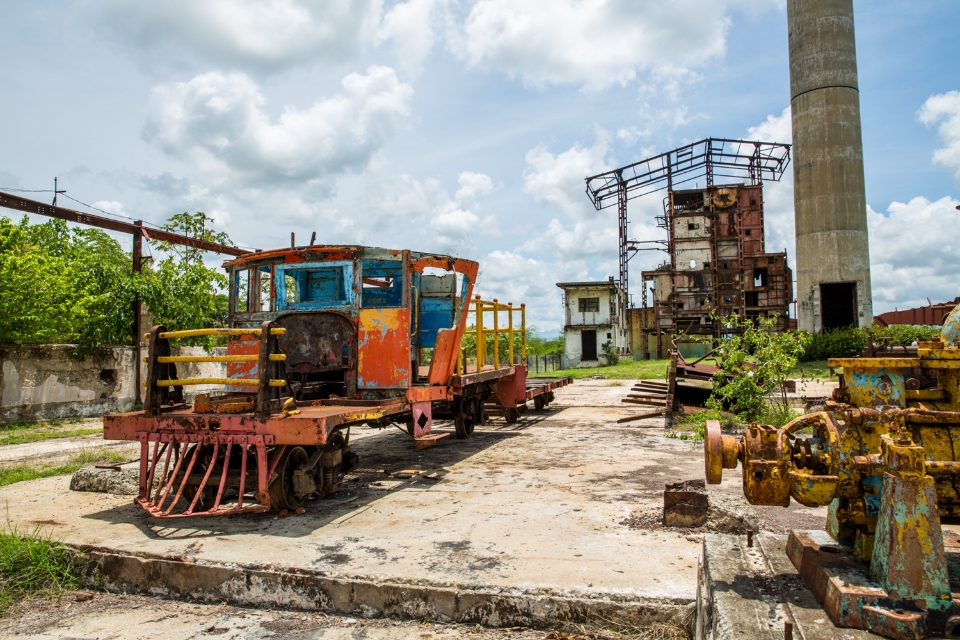
It was just past 8am in the morning, but the tropical sun in late April had already burned the dirt road. The city receded, the tallest bell towers disappeared, and then the blue sea appeared more and more clearly on the horizon. The highest point of the hill is a TV tower surrounded by a fence. The janitor cheerfully called in and motioned for me to climb up to the roof by a ladder made of a few sticks of wood, which could not have been more temporary. With all his enthusiasm, he passionately introduced each piece of the Los Ingenos valley amidst the mountains and forests. Look, there is the red dirt road, the old sugarcane railway, a small river, an iron bridge, green fields, palm trees… It’s amazing! His eyes sparkled, his voice filled with pride. He is typical of Cubans I have met. They are friendly, fun, hospitable and full of enthusiasm. Every Cuban loves beauty. They cherish old values and cherish the present moment. In their eyes, we can always read the sincere feelings that make us feel touched when we meet and nostalgic when we say goodbye.
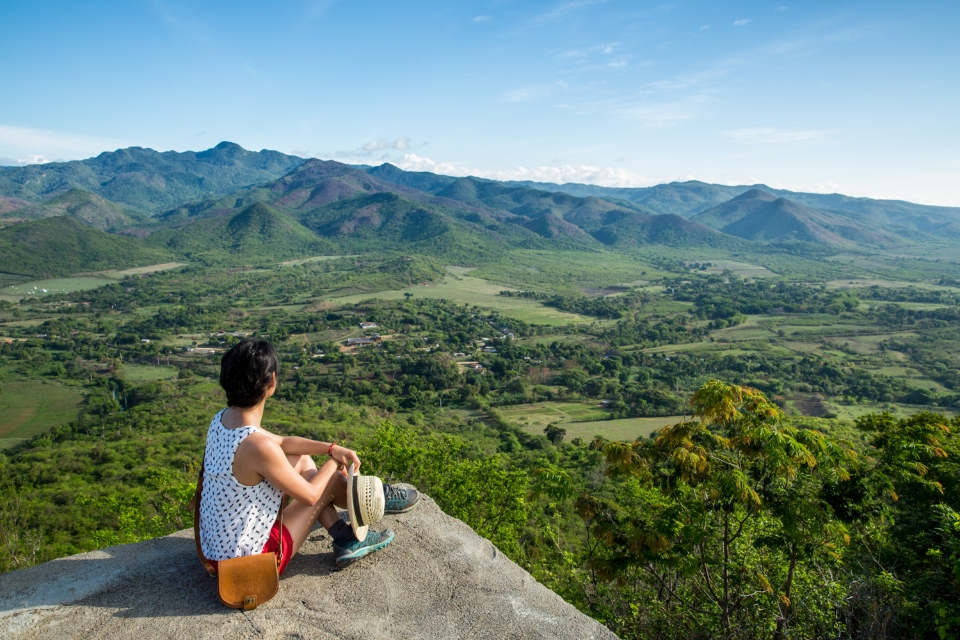
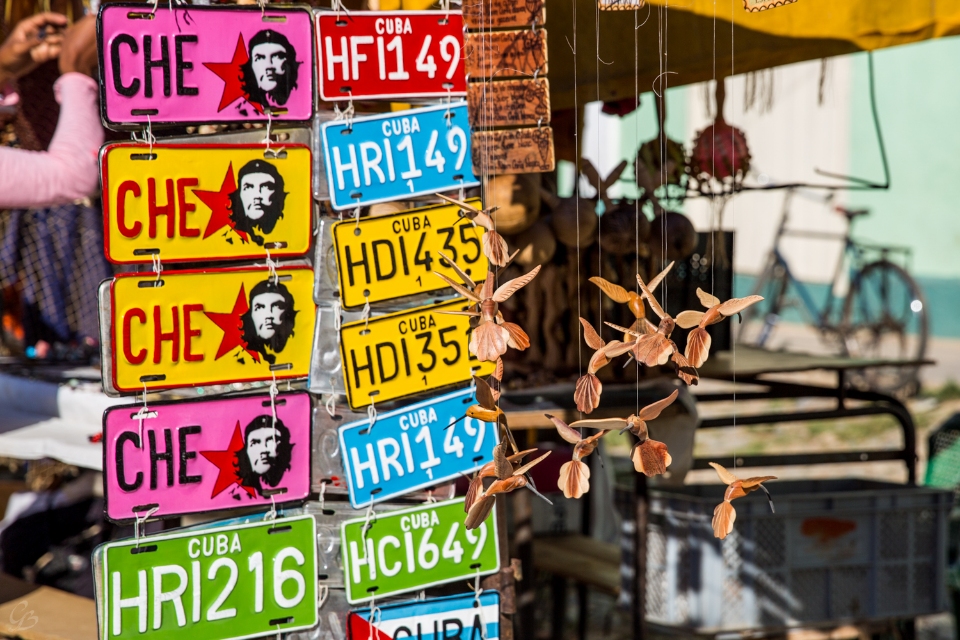
Things to do in Trinidad Cuba: Vibrant afternoon
When we returned to the heart of Trinidad, the streets were bustling again as usual. Around the middle of the day, feel free to find a little corner of Trinidad’s numerous bars and cafes. Café Don Pépé is a peaceful place to enjoy a shady colonial courtyard, sip a cup of delicious arabica coffee with a piece of Baracoa chocolate, and drift among Cuban tunes playing from the old radio placed on the bar.
On the other day, Taverna La Botija, Trinidad’s most popular bar, is also perfect for spending a lazy afternoon, squinting at the sweltering sun outside and tasting cool rum cocktails. Cuba is known around the world for its rum, premium c!gars and coffee. Havana Club is the most popular rum brand, heavily exported to Europe. Coming to Cuba, let collect yourself a few bottles of Santiago de Cuba or Legendario to bring back.
The Ron Collins, Mojito, Cuban libre or Daiquiri cocktails made from Cuban rum are all delicious. But in Trinidad, enjoying a glass of Canchanchara just feels right, true style. Canchanchara is a Trinidad specialty, with a sweet, hot and personal taste, made with honey, lemon juice, and of course Cuban rum.
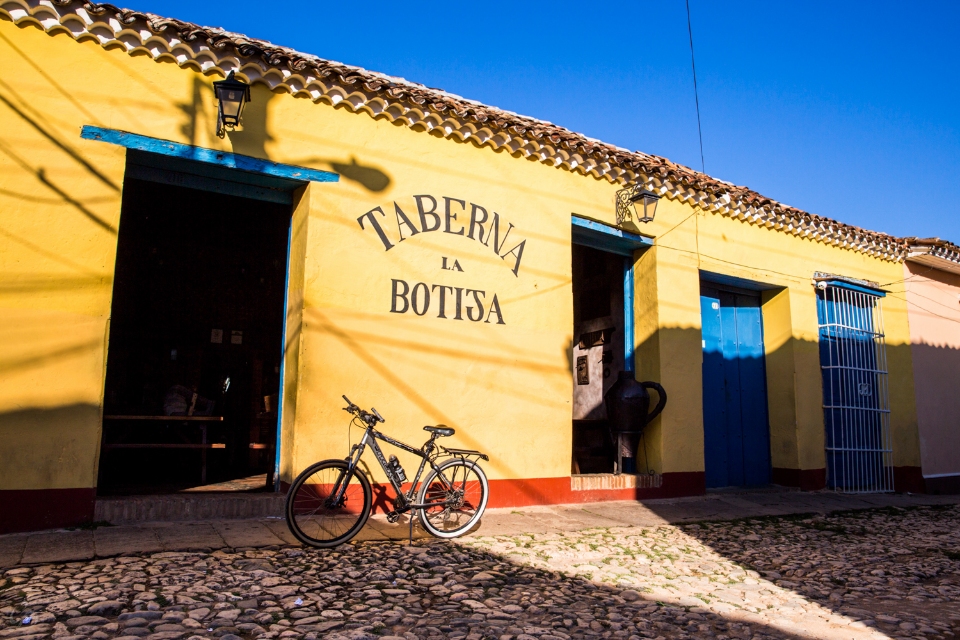
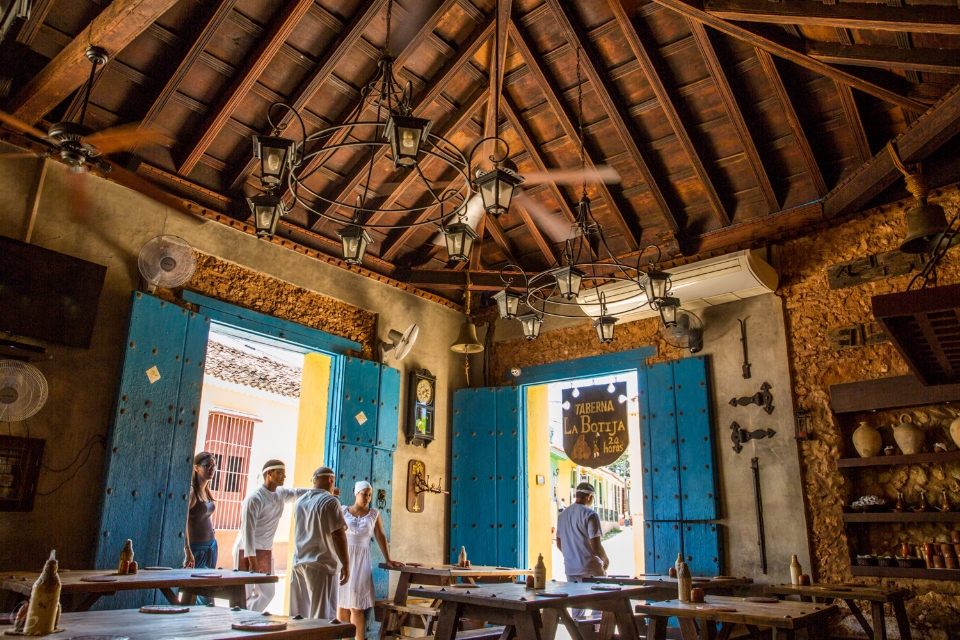
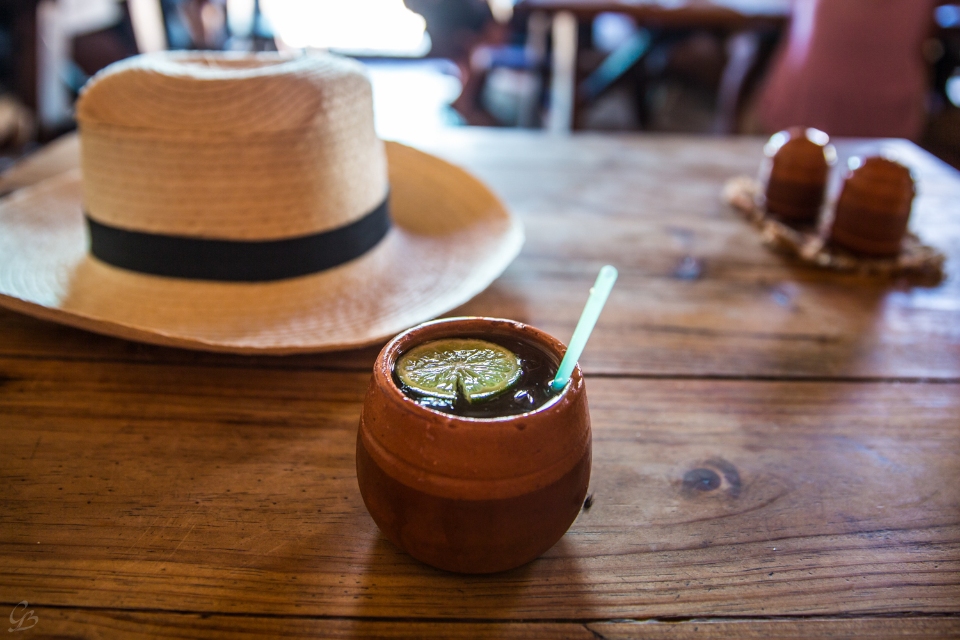
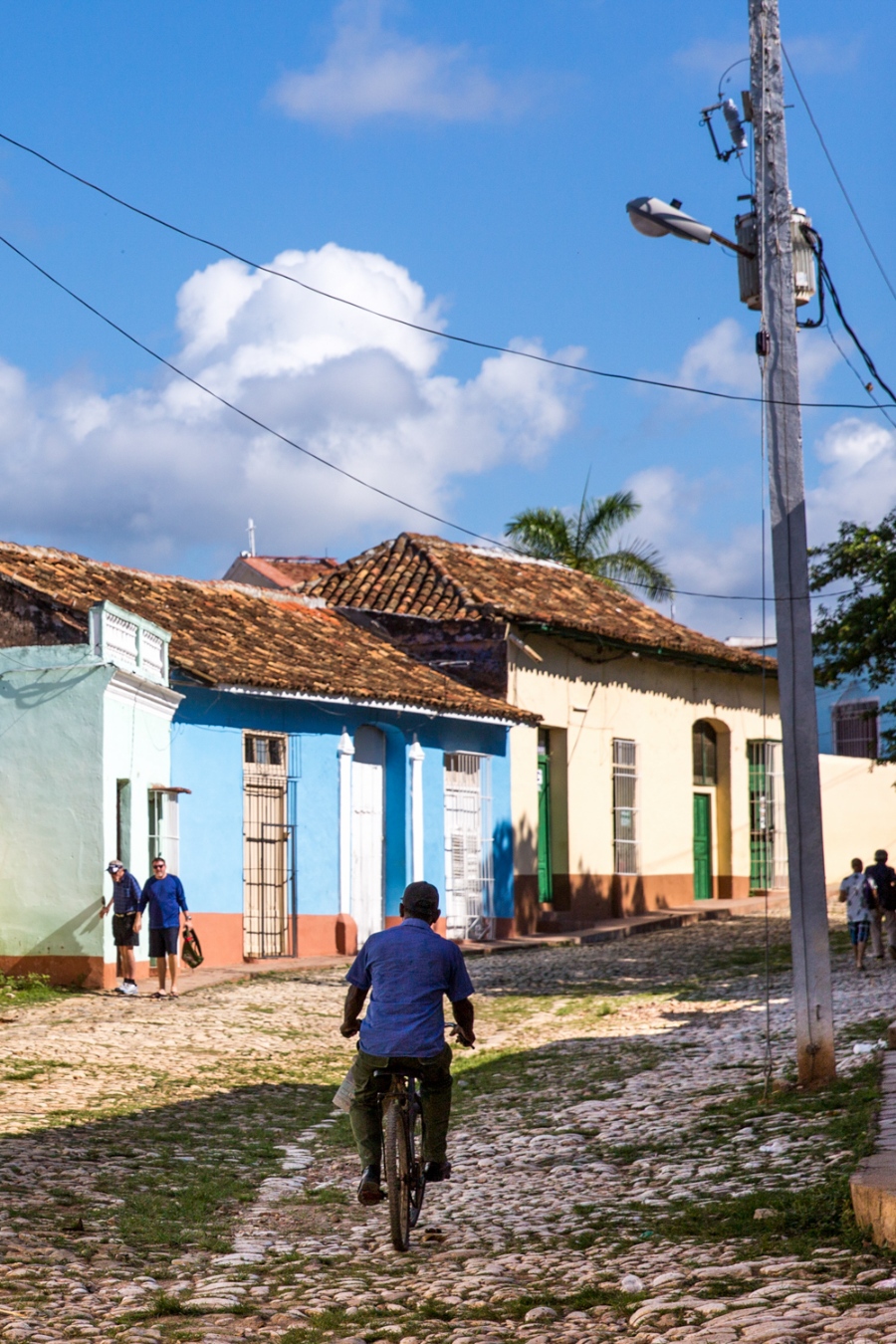
Trinidad’s scenery is most beautiful in the late afternoon, when the streets become bustling, vibes, lively but not rushed. The sunlight in early golden hours brings more vibrant on the brilliant colorful walls. The early century style horse-drawn carriages, the colorful vintage cars of the 50s, the sweet beautiful houses, the airy green gardens, the energetic Cuban people… All blended together in many shades of a perfect picture.
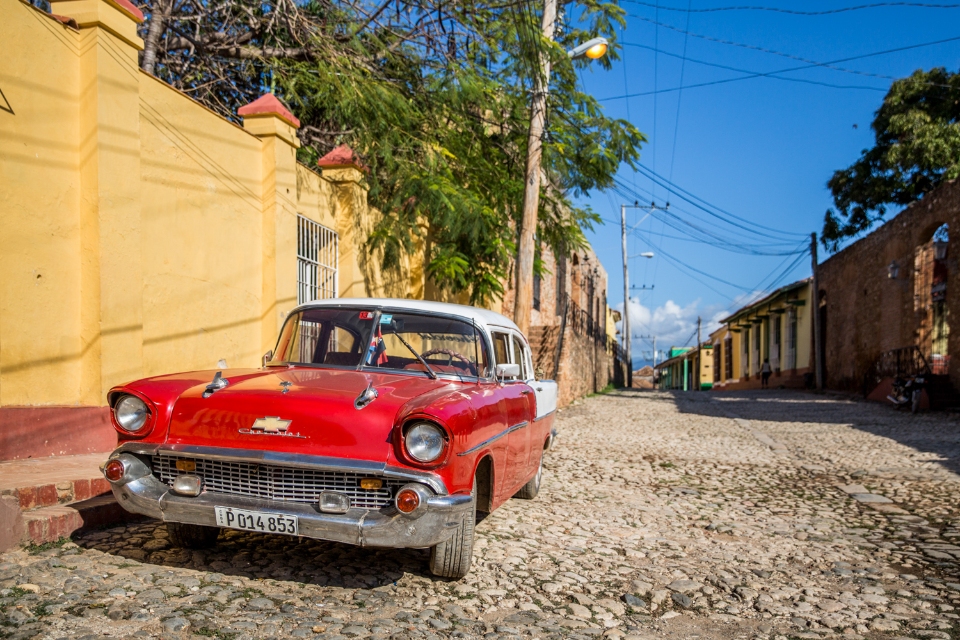
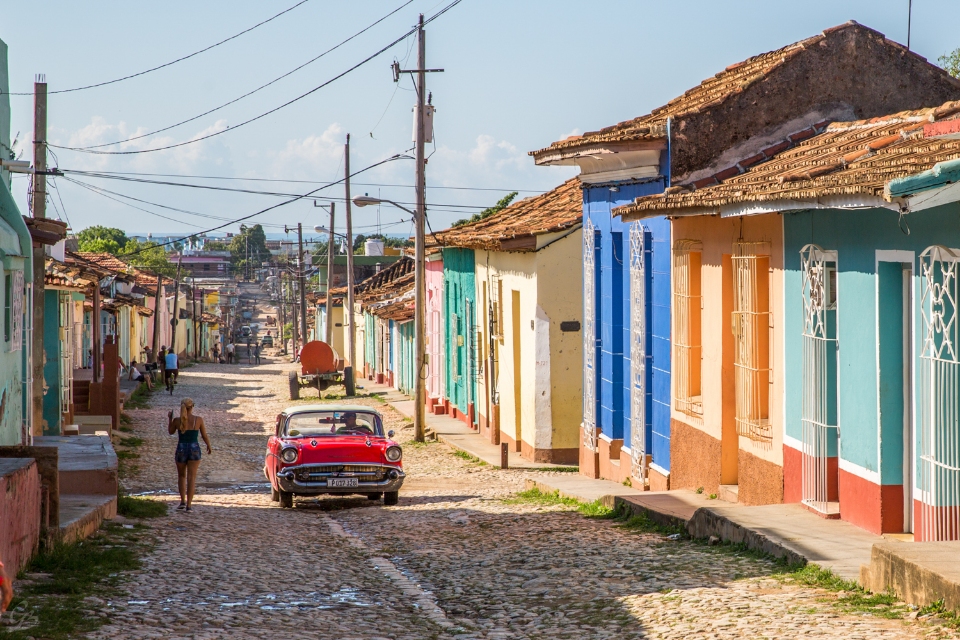
Nothing is more wonderful than watching Trinidad in the sunset on the bell tower of the Lucha contra Bandidos museum or the City History museum. The last rays of sunlight fell on the red-brown brick roofs. The rustic houses are interspersed with the steeply sloping roofs of the cathedral with its bell towers and the open spaces of the squares. Trinidad is surrounded by verdant mountains to the north and immense sea to the south. From above, it is possible to dimly predict the shape of the Sierra del Escambray, which is gradually darkening in the warm orange-yellow sun.
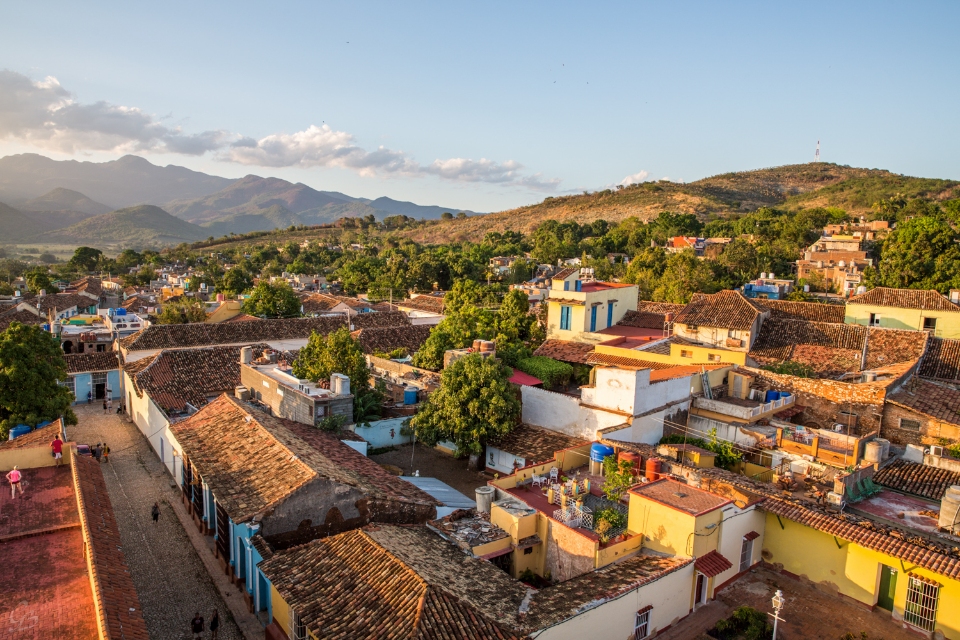
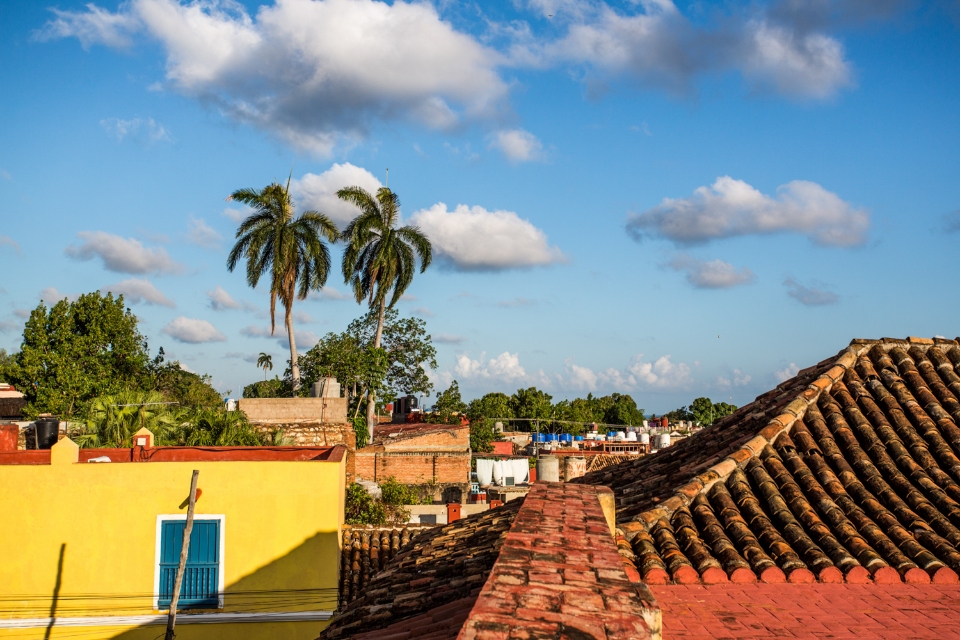
What to do in Trinidad Cuba: Hot night fall
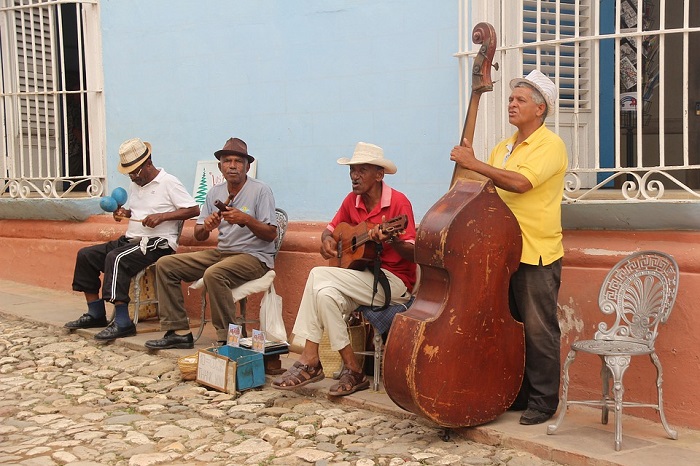
A day in Trinidad wouldn’t be complete without walking around the city once more at nightfall. As soon as the street lights up, the passionate, lively Cuban music resounded from all over the street. In bars and restaurants, live bands began playing the first Cuban tunes. Taverna La Botija is a gathering place for soul and jazz lovers. If you want to enjoy Cuban lobster specialties and listen to music in a candlelit setting, visit Terazza Colonial, climb up to the sweet romantic courtyard with pink Bougainvillea flowers hanging down the table.


The steps next to the cathedral were quiet this morning, now a gathering place for lovers of vibrant salsa dances. The country of Cuba brings many emotions both old and new. The daily life of Cubans bears many traces of a subsidized economy like Vietnam in the past. They don’t have much, but they enjoy it and live it to the fullest with what they have.
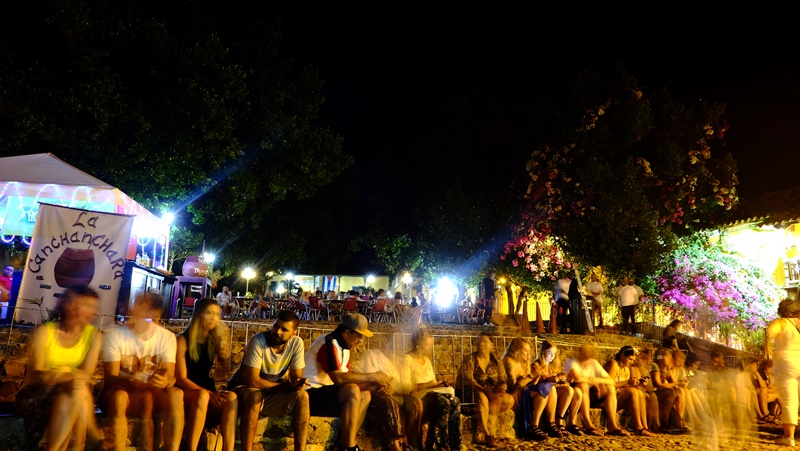
The daily rhythm of Trinidad’s life is like an ocean wave, calm in the morning, more bustling and vibrant in the evening, gradually reaching a climax and breaking into the night and then returning to silence the next morning. Evening is the time when Cuban culture is most profoundly revealed. It is a fusion of indigenous, African and European cultures. Likewise, Cuban music is the result of a love story between African drum and Spanish guitar. Cubans love music and know how to infuse optimism and excitement into it. I don’t know from when on the long road in Cuba, the music that is both vibrant, tender and sensitive has been imprinted in my heart. As a famous Cuban musician once said: “I don’t compose, I dream of music. Sometimes I wake up with a melody in my heart.”
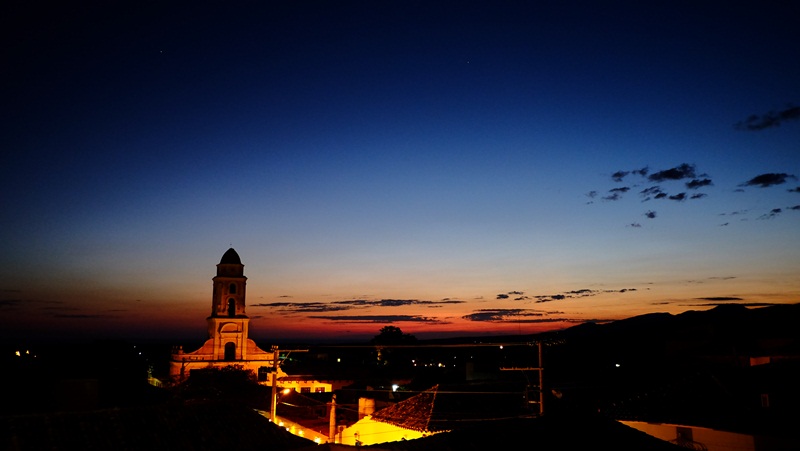
How to get to Cuba
Visa
Visa to Cuba costs about 20 USD, can be applied at the embassy in Hanoi, consulate in Ho Chi Minh City or bought at the border gate when coming to Cuba. There are rumors that Vietnamese passport holders do not need a visa to enter Cuba, but due to the lack of official documents, it is not always applicable. The Cuban visa is called a tourist card, not glued or stamped in the passport but as a separate passport-style paper.
Traveling
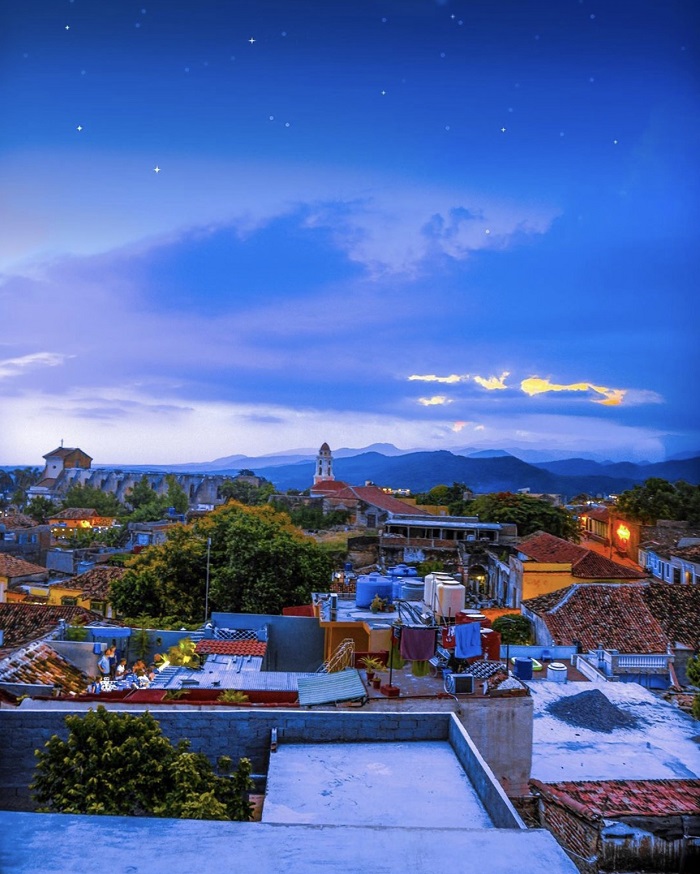
- There is no direct flight from Vietnam to Cuba, need to transit through a third country, such as France, Russia, Germany, Canada, to the capital Havana.
- Within Cuba, visitors can travel between major cities by Cubana airline (http://www.cubana.cu/) and some strange destinations by Aerogaviota (http://www.aerogaviota.com/).
- Cuba also has a good long-distance bus system for foreign tourists with cool air conditioning and is very punctual. The two main bus companies are Víazul, which can be purchased tickets in advance via the internet (https://www.viazul.com/) and Transtur, which can only be purchased on the spot.
- If you have time, trying to take the train in Cuba is also a good experience. Trains run between provincial capitals, buy tickets directly at the train stations.
- Cuba is also has taxi, for about 1 CUC (about 1 USD / 1 km). Bargain price with driver.
- Colectivos is a cheap Cuban taxi. It only runs when full and can stop at any time to catch passengers. In turn, the price is agreed upon with the driver and is usually very cheap.
- If you want to be completely active, you can rent a self-drive car or a car with a driver. Renting a car is much more expensive than in the US or Europe due to the scarcity of cars in Cuba.
- The main roads between crowded tourist cities, the road condition is quite good, not to the point of pathetic as rumored. Perhaps the Cuban state has invested in renewing the road system to serve tourism demand in recent years.
Money exchange
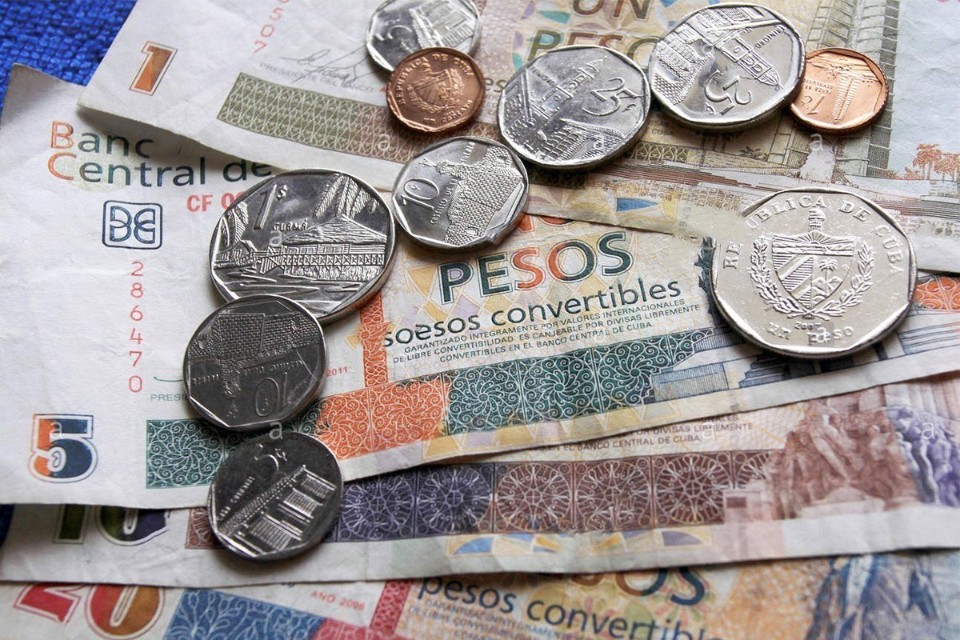
In Cuba, you will be charged a very expensive fee if you want to exchange USD. Therefore, it is advisable to bring other strong currencies, such as Euro or CAD. Except when exchanging money at the reception of luxury hotels (will be low rate), in addition, the exchange rate at money exchangers or banks is the same. You can exchange right at the airport without worrying about the low exchange rate compared to outside.
Trinidad blog: Delicious restaurants in Trinidad
Restaurants
Food in Cuba cannot be called delicious compared to other places because of limited ingredients, very well cooked and slightly salty taste. The restaurants below I have tried and found the best.
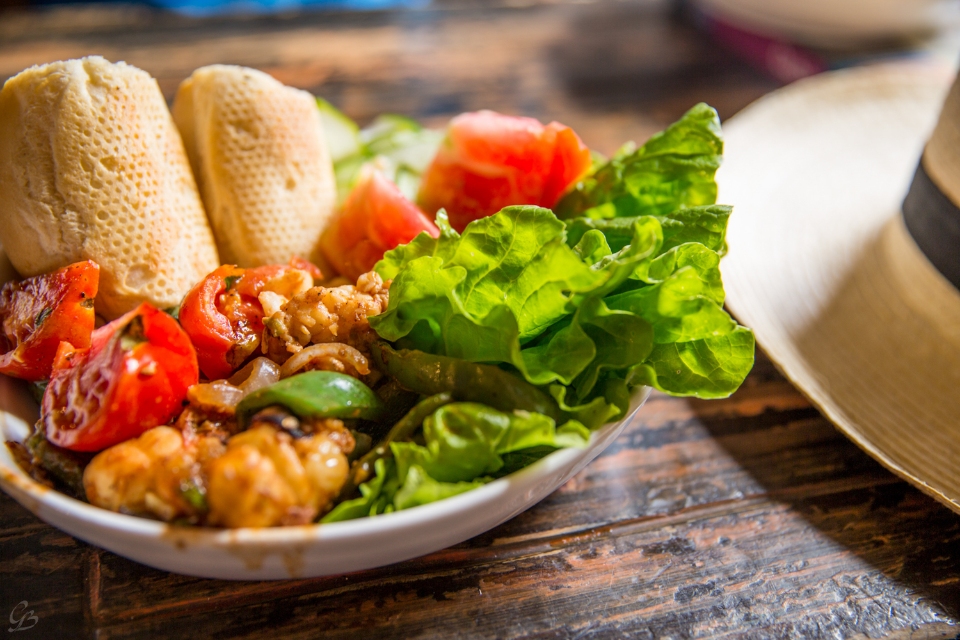
- Terraza Colonial, with a very romantic courtyard with paper flower plants hanging down to the table. This shop also has the cheapest lobster in Trinidad, 12 CUC / 1.
- Cubita Restaurant, I think this is the best restaurant in Trinidad that I have tried. Nice interior decoration, subtle food (compared to the common ground of Cuba).
- Sol Ananda, the shop is located in a beautiful old house, decorated with old furniture as it before. Right near the main street and the food is good too.
- Vista Gourmet, with a space is located on the terrace with a beautiful view, from here you can see the red tile roofs of Trinidad. The restaurant’s buffet is a bit expensive but it’s okay to eat. The shop is always very crowded, you have to book a table the day before if you want to have a place.
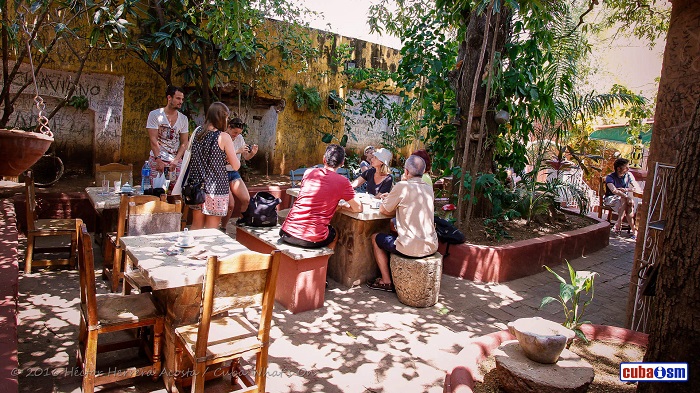
Cafes and Bars
- Taberna La Botija, if you choose just one bar in Trinidad, go to Taberna La Botija. Food and drink are delectable, tasty. The evening is extremely lively thanks to Trinidad’s best family jazz band.
- Café Don Pepe, this is my favorite place to drink coffee or a cocktail and enjoy the quiet garden in Trinidad afternoons. Quiet space reminiscent of a bygone era.

Accommodation in Cuba
Of course, Cuba also has great hotels and resorts like other parts of the world. But when I come here, I like to stay at home-stay-style inns that the locals call Casa Particular.
Families in Cuba can afford to rent out1 or 2 rooms in their house for guests, the price is usually around 25 CUC / 1 double room (equivalent to 25 USD, 2022 price). Here, I can see Cuban life from the inside, very interesting.

As of 2022, room service in Cuba is not available on the hotel website I use often, only contacting via airbnb or direct bargaining.
If you planning to stay in a city for few days and it is not during peak season, you can only book online for the first day. Then go for a walk and choose the next place to stay later. Every particular casa in Cuba has a very distinctive sign right in front of the house (the white sign has a sign like an eye), easy to distinguish. Direct bargaining can reduce the price a bit, about 20%.
To find top and best hotels in Trinidad, you can refer here.
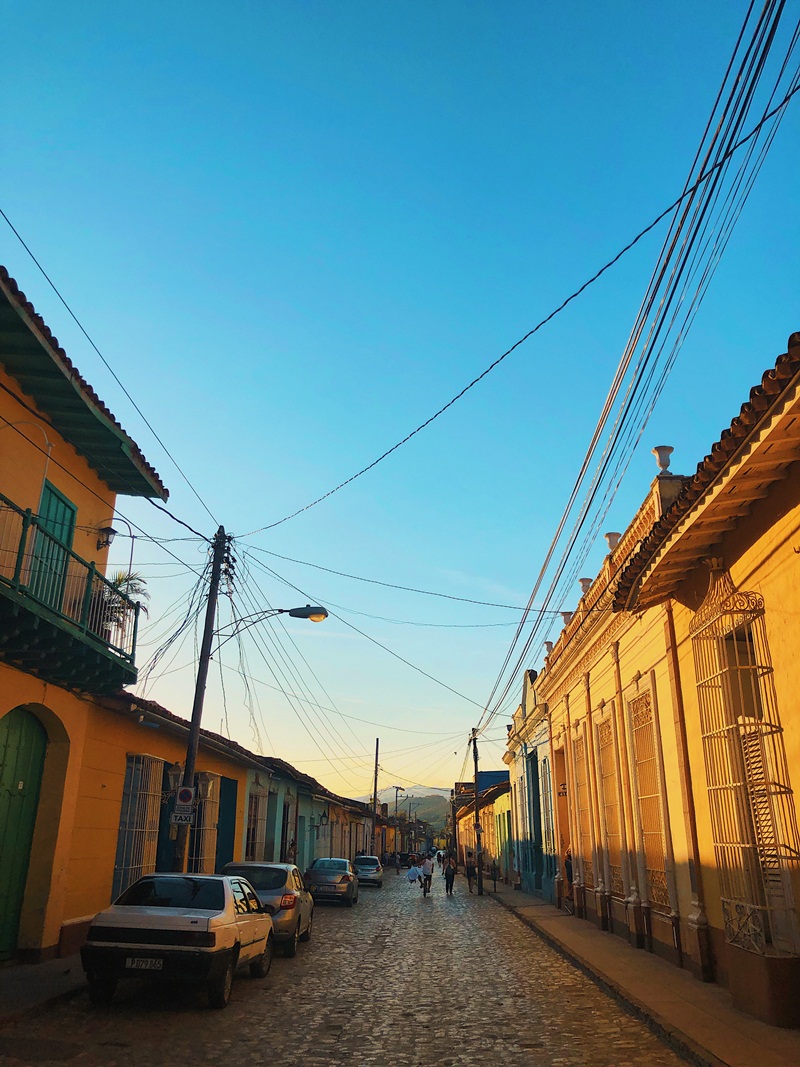
Read more Cuba travel guide here.

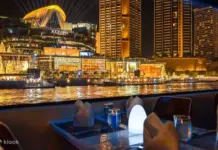
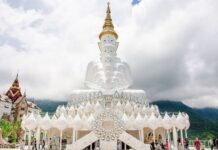


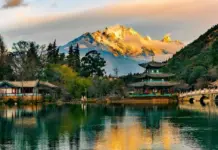
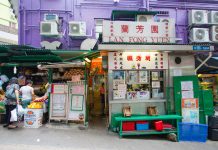
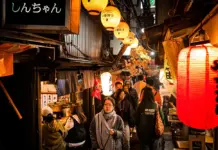
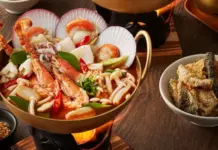


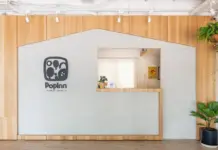
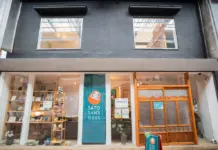
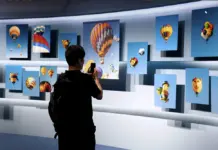

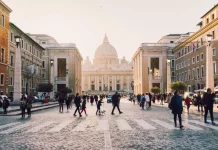



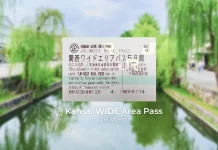

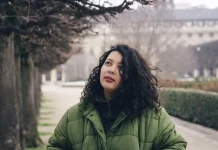
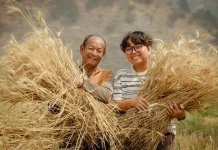
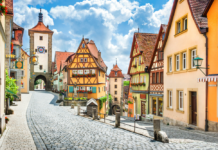


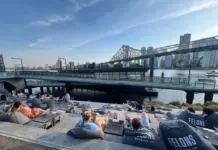



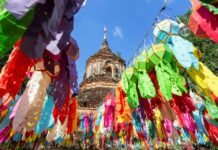
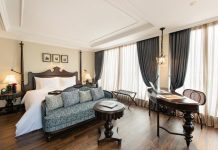
![10 best airports in Asia in 2016 [RANKED] kuala-lumpur-international-airport-best airports in asia in 2016 by skytrax ratings](https://livingnomads.com/wp-content/uploads/2016/08/29/kuala-lumpur-international-airport-best-airports-in-asia-in-2016-by-skytrax-ratings-218x150.jpg)

